【英语】情态动词练习题含答案
【英语】情态动词练习题含答案及解析
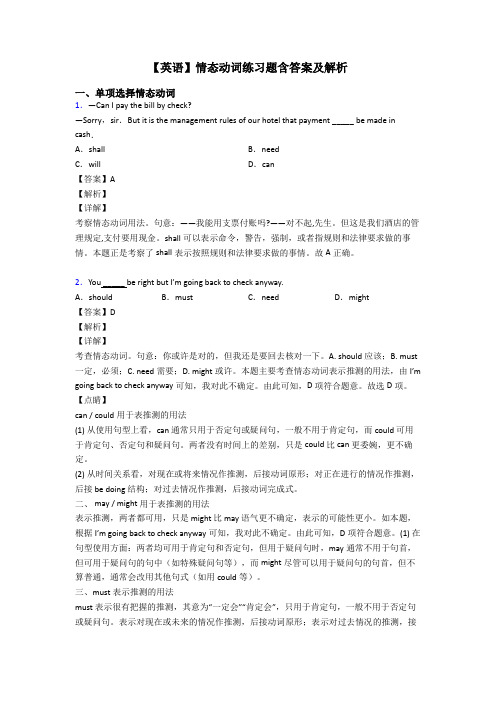
【英语】情态动词练习题含答案及解析一、单项选择情态动词1.—Can I pay the bill by check?—Sorry,sir.But it is the management rules of our hotel that payment _____ be made in cash.A.shall B.needC.will D.can【答案】A【解析】【详解】考察情态动词用法。
句意:——我能用支票付账吗?——对不起,先生。
但这是我们酒店的管理规定,支付要用现金。
shall可以表示命令,警告,强制,或者指规则和法律要求做的事情。
本题正是考察了shall表示按照规则和法律要求做的事情。
故A正确。
2.You _____ be right but I’m going back to check anyway.A.should B.must C.need D.might【答案】D【解析】【详解】考查情态动词。
句意:你或许是对的,但我还是要回去核对一下。
A. should应该;B. must 一定,必须;C. need需要;D. might或许。
本题主要考查情态动词表示推测的用法,由I’m going back to check anyway可知,我对此不确定。
由此可知,D项符合题意。
故选D项。
【点睛】can / could用于表推测的用法(1) 从使用句型上看,can 通常只用于否定句或疑问句,一般不用于肯定句,而could 可用于肯定句、否定句和疑问句。
两者没有时间上的差别,只是could 比 can 更委婉,更不确定。
(2) 从时间关系看,对现在或将来情况作推测,后接动词原形;对正在进行的情况作推测,后接 be doing 结构;对过去情况作推测,后接动词完成式。
二、 may / might用于表推测的用法表示推测,两者都可用,只是 might 比 may 语气更不确定,表示的可能性更小。
初二情态动词练习题及答案

初二情态动词练习题及答案一、选择题1. – _______ I go to the party tonight?– No, you _______. You have to finish your homework.A. Can; mustn'tB. May; mustC. Can; can'tD. May; can't2. Tom _______ swim when he was 5 years old.A. couldB. canC. mayD. might3. – _______ I borrow your pencil?– Of course you _______.A. Can; mayB. May; canC. Could; couldD. Might; can4. We _______ see the stars very clearly in the city because there is too much light pollution.A. mustB. can'tC. may notD. don't have to5. _______ I watch TV before I finish my homework?A. MustB. WillC. Can'tD. Should二、填空题1. You _______ finish your vegetables if you want dessert.2. _______ we go to the beach tomorrow if it doesn't rain?3. I'm not sure if I _______ make it to the party tonight. I might have another appointment.4. He _______ have been tired after running for three hours.5. – _______ I join the school band?– Absolutely! You have a great voice.三、改错题1. I musted finish my homework before I could go out and play.2. May I borrow your pen? – Certainly. You can borrowing it.3. She cannot to come to the party because she has a piano lesson.4. You should to take an umbrella with you. It might rain later.5. He shouldn't not eat too much junk food. It's bad for his health.四、翻译题1. 你可以帮我一下吗?2. 我可以去朋友家玩吗?3. 我们应该如何处理这个问题?4. 你可以告诉我作业的答案吗?5. 他可能会迟到。
初中英语情态动词练习
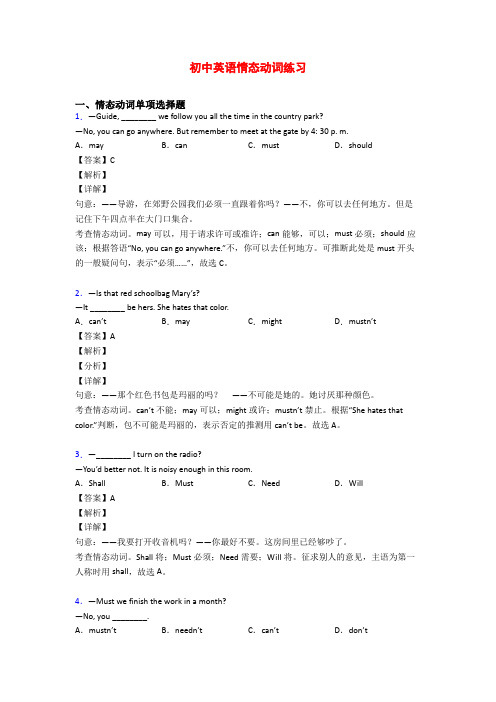
初中英语情态动词练习一、情态动词单项选择题1.—Guide, ________ we follow you all the time in the country park?—No, you can go anywhere. But remember to meet at the gate by 4: 30 p. m.A.may B.can C.must D.should【答案】C【解析】【详解】句意:——导游,在郊野公园我们必须一直跟着你吗?——不,你可以去任何地方。
但是记住下午四点半在大门口集合。
考查情态动词。
may可以,用于请求许可或准许;can能够,可以;must必须;should应该;根据答语“No, you can go anywhere.”不,你可以去任何地方。
可推断此处是must开头的一般疑问句,表示“必须……”,故选C。
2.—Is that red schoolbag Mary’s?—It ________ be hers. She hates that color.A.can’t B.may C.might D.mustn’t【答案】A【解析】【分析】【详解】句意:——那个红色书包是玛丽的吗?——不可能是她的。
她讨厌那种颜色。
考查情态动词。
can’t不能;may可以;might或许;mustn’t禁止。
根据“She hates that color.”判断,包不可能是玛丽的,表示否定的推测用can’t be。
故选A。
3.—________ I turn on the radio?—You’d better not. It is noisy enough in this room.A.Shall B.Must C.Need D.Will【答案】A【解析】【详解】句意:——我要打开收音机吗?——你最好不要。
这房间里已经够吵了。
考查情态动词。
Shall将;Must必须;Need需要;Will将。
【英语】情态动词(完整版)
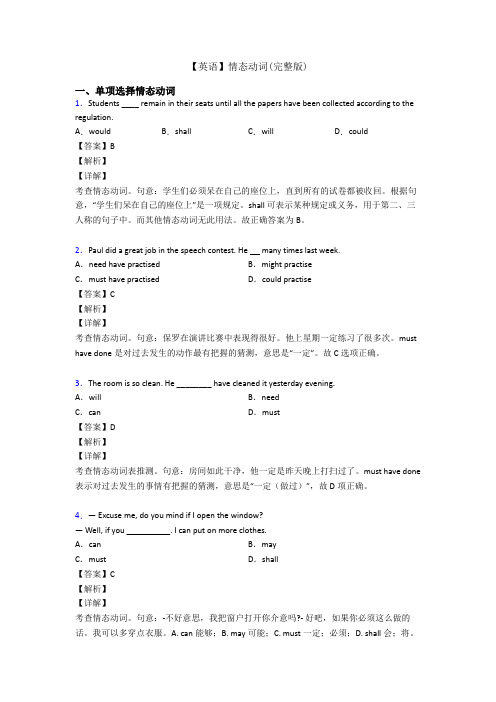
【英语】情态动词(完整版)一、单项选择情态动词1.Students ____ remain in their seats until all the papers have been collected according to the regulation.A.would B.shall C.will D.could【答案】B【解析】【详解】考查情态动词。
句意:学生们必须呆在自己的座位上,直到所有的试卷都被收回。
根据句意,“学生们呆在自己的座位上”是一项规定。
shall 可表示某种规定或义务,用于第二、三人称的句子中。
而其他情态动词无此用法。
故正确答案为B。
2.Paul did a great job in the speech contest. He many times last week.A.need have practised B.might practiseC.must have practised D.could practise【答案】C【解析】【详解】考查情态动词。
句意:保罗在演讲比赛中表现得很好。
他上星期一定练习了很多次。
must have done是对过去发生的动作最有把握的猜测,意思是“一定”。
故C选项正确。
3.The room is so clean. He ________ have cleaned it yesterday evening.A.will B.needC.can D.must【答案】D【解析】【详解】考查情态动词表推测。
句意:房间如此干净,他一定是昨天晚上打扫过了。
must have done 表示对过去发生的事情有把握的猜测,意思是“一定(做过)”,故D项正确。
4.— Excuse me, do you mind if I open the window?— Well, if you __________. I can put on more clothes.A.can B.mayC.must D.shall【答案】C【解析】【详解】考查情态动词。
(完整版)情态动词专项练习(含答案)
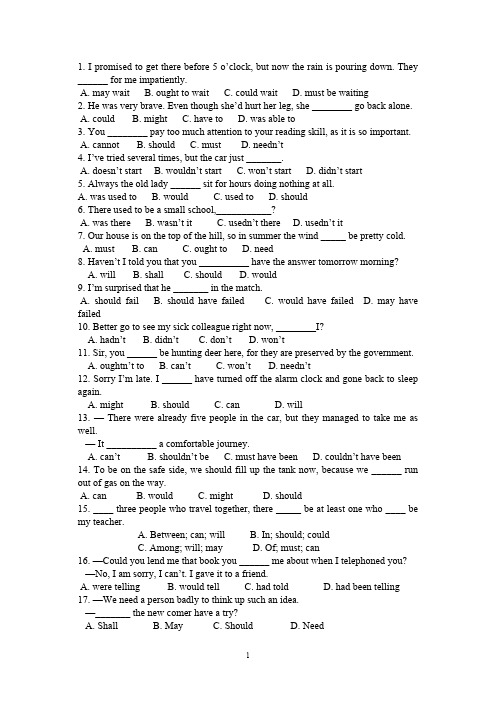
1. I promised to get there before 5 o’clock, but now the rain is pouring down. They ______ for me impatiently.A. may waitB. ought to waitC. could waitD. must be waiting2. He was very brave. Even though she’d hurt her leg, she ________ go back alone.A. couldB. mightC. have toD. was able to3. You ________ pay too much attention to your reading skill, as it is so important.A. cannotB. shouldC. mustD. needn’t4. I’ve tried several times, but the car just _______.A. doesn’t startB. wouldn’t startC. won’t startD. didn’t start5. Always the old lady ______ sit for hours doing nothing at all.A. was used toB. wouldC. used toD. should6. There used to be a small school,___________?A. was thereB. wasn’t itC. usedn’t thereD. usedn’t it7. Our house is on the top of the hill, so in summer the wind _____ be pretty cold.A. mustB. canC. ought toD. need8. Haven’t I told you that you __________ have the answer tomorrow morning?A. willB. shallC. shouldD. would9. I’m surprised that he _______ in the match.A. should failB. should have failedC. would have failedD. may have failed10. Better go to see my sick colleague right now, ________I?A. hadn’tB. didn’tC. don’tD. won’t11. Sir, you ______ be hunting deer here, for they are preserved by the government.A. oughtn’t toB. can’tC. won’tD. needn’t12. Sorry I’m late. I ______ have turned off the alarm clock and gone back to sleep again.A. mightB. shouldC. canD. will13. — There were already five people in the car, but they managed to take me as well.— It __________ a comfortable journey.A. can’tB. shouldn’t beC. must have beenD. couldn’t have been14. To be on the safe side, we should fill up the tank now, because we ______ run out of gas on the way.A. canB. wouldC. mightD. should15. ____ three people who travel together, there _____ be at least one who ____ be my teacher.A. Between; can; willB. In; should; couldC. Among; will; mayD. Of; must; can16. —Could you lend me that book you ______ me about when I telephoned you?—No, I am sorry, I can’t. I gave it to a friend.A. were tellingB. would tellC. had toldD. had been telling17. —We need a person badly to think up such an idea.—_______ the new comer have a try?A. ShallB. MayC. ShouldD. Need18. We ________ so tired. We’ve only been to a party.A. mustn’t have feltB. wouldn’t have feltC. shouldn’t have feltD. couldn’t have felt19. Professor Smith, many students want to see you. __________ they wait here or outside?A. DoB. ShallC. WillD. Would20. —How about paying a visit to Mr. Richardson, our former history teacher?—Good idea. I will e-mail him today so he _____know _________ to expect us.A. shall; whyB. may; whenC. would; whyD. will; how21. —I went to work on foot yesterday, though it _________ cats and dogs.—You __________ by bus. It was likely to get a cold.A. is raining; must have goneB. rained; would goC. was mining; should have goneD. have rained; could have gone22. You ______ pay too much attention to your reading skill, as it is so important.A. cannotB. shouldC. mustD. needn’t23. I told Sally to fix him up with this job, but perhaps I _________ it out for her.A. had to writeB. must have writtenC. should have writtenD. ought to write24. My sister met him at the Grand Theatre yesterday afternoon, so he ________ your lecture.A. couldn’t have attendedB. needn’t have attendedC. mustn’t have attendedD. shouldn’t have attended25. Research findings show we spend about two hours dreaming every night, no matter what we ________ during the day.A. should have doneB. would have doneC. may have doneD. must have done26. —Is there any flight to Tokyo today?— I think there _____, for the weather is too bad.A. mustn’t beB. mightn’t beC. needn’t beD. can’t be27. —I’m told that John had another car accident this morning.— I believe not. He _____ so careless.A. shouldn’t have beenB. wouldn’t have beenC. couldn’t have beenD. mustn’t have been28. It was playing computer games that cost the boy a lot of time that he __________ doing his lessons.A. might have spentB. ought to have spentC. must have spentD. could have spent29. —I didn’t know you were good friends.—You _______. I have known her since she moved here. You were studying abroad then.A. may haveB. needn’t haveC. couldn’t haveD. must have30. They must have finished the work by the end of last month, __________?A. mustn’t theyB. haven’t theyC. hadn’t theyD. didn’t they31. —I didn’t see her yesterday.— Of course, you _____, because he had gone for a trip.A. can’tB. may not haveC. can’t haveD. mustn’t have32. You ________ phone him if you want to, but you _________. He is sure to phone you.A. may; mustn’tB. have to; needn’tC. can; doesn’t needD. can; needn’t33. — She must have gone back to the valley.— ______, she _____ have. The entrance to it was nowhere to be found.A. No; mustn’tB. Yes; mightC. Yes; couldD. No; couldn’t34. He _____ full marks, but he was so careless as to make a spelling mistake.A. must have gainedB. can have gainedC. could have gainedD. must gain35. From what you said, she _____ you about it.A. mustn’t have toldB. can’t have toldC. mustn’t tellD. can’t tell36. — You ought to have made an apology to Tom yesterday evening.— Yes, I know I _________.A. ought toB. have toC. should haveD. must have37. —Is there a fog in the evening?—There _______ be. I’ll make a phone call to find it out.A. mustB. wouldC. willD. might38. — _______ he help you with the problem?—Well, though it is very hard, __________ I’ll do what I can to work it out.A. Shall; butB. Can; andC. Must; howeverD. Will; still39. —How is that, Joan?—Yeah, it’s from the boss. She _________ first, whether she likes it.A. shall goB. ought to have goneC. should goD. must have gone40. —Would you like to watch the video, in which you can see foreigners making jiaoji during the Spring Festival?—Sure, it ______ be very interesting.A. shouldB. mayC. canD. will41. —The door was open.—It _________ open. I had locked it myself and the key was in my pocket.A. can not beB. must not beC. can not have beenD. must not have been42. —Where ________ Margaret have put the empty bottles?—She ________ them away. They must be somewhere.A. can; can’t have thrownB. must; needn’tC. must; must have thrownD. cant; must throw43. —Mum, I climbed to get the Teddy Bear from the top of the shelf.—My goodness! You _______ yourself. You ______ do that next time.A. must have hurt; mustn’tB. should have hurt; can’tC. may have hurt; mustn’tD. might have hurt; won’t be able to44. —Shall I go and buy more food and drinks for the party?—No, we have prepared a fridge of those. That _______ be quite enough.A. canB. mayC. mightD. ought to45. —Hurry up, Michael! It’s ten to three.—Goodness me! The class_______. I’ll be late again.A. must beginB. may beginC. should have begunD. must have begun46. When he was there, he ____ go to that coffee shop at the street comer after work every day.A. wouldB. shouldC. had betterD. might47. —I hear you have written a novel.—Yes, the book ________ be out in a month or so.A. canB. dareC. shouldD. need48. —How could I thank you enough?—Don’t mention it. Any other man _________ that.A. must doB. could doC. would have doneD. should have done49. —Why aren’t they here yet?—They ________ the bus.A. can have missedB. must be late forC. may have missedD. might be late for50. Mike _______ come to see me I don’t want to go out in case he comes.A. canB. mustC. mayD. will51. The thief ________ in from the kitchen window as the door was closed.A. may climbB. must have climbedC. could have climbedD. should have climbed52. —You didn’t invite Bill?— __________ him too?A. Must I inviteB. Must I have invitedC. Should I inviteD. Should I have invited53. —Why didn’t you attend the lecture yesterday?—I didn’t think that we _______ on Sundays.A. shouldB. ought to haveC. shouldn’t haveD. will have to54. It’s said that there are plenty of hotels in that town. There ______ be any difficulty for you to find somewhere to stay.A. wouldn’tB. mustn’tC. shouldn’tD. needn’t55. —Would you be here to attend the English party this evening?—Yes, we _________.A. shallB. wouldC. willD. must56. On Sundays when I was a child, Father and I _______ get up early and go fishing.A. couldB. wouldC. mightD. should57. —You’d better keep quiet in class.—Sometimes I ________ Yesterday, I was very quiet during my English class.A. wouldB. doC. didD. have58. I lived with my sister this summer and didn’t have to pay rent. So I ______ save most of my salary.A. couldB. wouldC. was able toD. should59. —Look, John’s fallen asleep.— Oh, he _______ too late last night.A. might sit upB. should have sat upC. could sit upD. must have sat up60. —I posted the letter a week ago.—Then they __________ the letter by now. It usually takes four days.A. can have receivedB. must receiveC. should receiveD. ought to have received61. He used to teach in that university and I _________ ride past it on my way to work.A. wouldB. couldC. shouldD. might62. —So you have to leave now.—Yes, I __________.—How nice it would be if you could stay a bit longer!A. have toB. ought toC. doD. have63. He _______ Shanghai, for I saw him talking with the headmaster a moment ago.A. must have gone toB. can’t have gone toC. mustn’t have been toD. can’t have been to64. From what I learn about their hotel, the service and the weather, they _____ their holiday very much.A. wouldn’t have enjoyedB. shouldn’t have enjoyedC. needn’t have enjoyedD. can’t have enjoyed65. It is not like Jack to be unfriendly, so he _________ you when you called.A. can’t have seenB. should not have seenC. must not have seenD. need not have seen66. —Many people in England love to give advice on weather reporting.—Yes, but I think the weather office’s computers _________ be more accurate.A. canB. mustC. ought toD. might67. —The farmers lived near the high way.—________ very noisy.A. It must have beenB. They must beC. That might beD. There must be68. She is too slow. She ________ pass the test, but she __________ too little.A. would; knewB. will; knowsC. would; knowsD. will; knew69. —Mary didn’t turn up last time, did she?—No. She_________. We had changed our plan.A. shouldn’t have comeB. needn’t have to comeC. didn’t need to comeD. needn’t have come70. —They haven’t finished the work up to now.—Well, they________.A. shouldB. should haveC. wouldD. must have71. —Shall I go and buy more fruit for the party?—No, I have already bought 3 baskets. That _________ be enough.A. canB. ought toC. mayD. might72. —Why hasn’t the speaker turned up?—He _________ the flight. I’ll find it out at once.A. must have missedB. might have missedC. would have missedD. could have missed73. I _______ pay Tom a visit, but I am not sure whether I will have time this Sunday.A. shouldB. mightC. wouldD. could74. —Who is the girl standing over there?— Well, if you _____ know, her name is Mabel.A. mayB. canC. mustD. shall75. It has been announced that candidates (考生)________ remain in their seats until all the papers have been collected.A. canB. willC. mayD. shall【答案解析】1.D。
情态动词练习题带答案
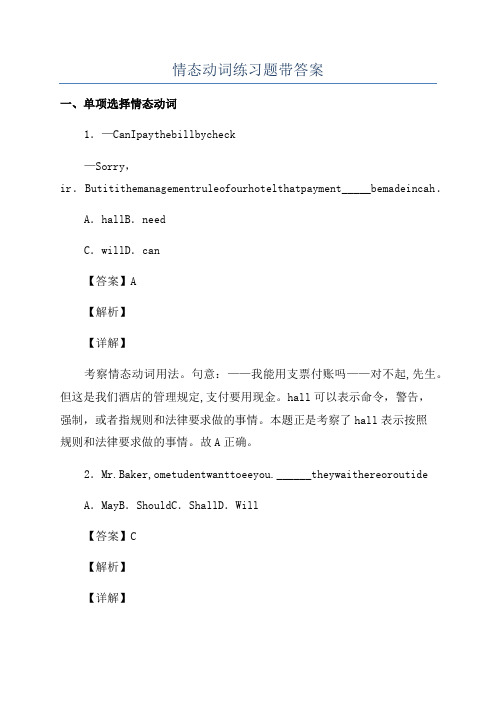
情态动词练习题带答案一、单项选择情态动词1.—CanIpaythebillbycheck—Sorry,ir.Butitithemanagementruleofourhotelthatpayment_____bemadeincah.A.hallB.needC.willD.can【答案】A【解析】【详解】考察情态动词用法。
句意:——我能用支票付账吗——对不起,先生。
但这是我们酒店的管理规定,支付要用现金。
hall可以表示命令,警告,强制,或者指规则和法律要求做的事情。
本题正是考察了hall表示按照规则和法律要求做的事情。
故A正确。
2.Mr.Baker,ometudentwanttoeeyou.______theywaithereoroutideA.MayB.ShouldC.ShallD.Will【答案】C【解析】【详解】考查Shall的用法。
句意:贝克先生,有些学生想见你。
他们是在这里等还是在外面等Shall用于第一、第三人称疑问句中,表示说话人征求对方的意见或向对方请示。
故选C。
【点睛】Shall的用法Shall作为助动词,一般用于第一人称Ⅰ和We,表示一个将来的动作,构成将来时态。
Shall后面接动词原形。
例如:(1)IhallthinkitoverandLetyouknowmyidea.我将考虑一下此事,然后告诉你我的想法。
1.Shall用于第一人称,表示征求对方的意愿。
如:Whathallwedothievening2.Shall用于第一、第三人称疑问句中,表示说话人征求对方的意见或向对方请示。
如:ShallwebeginourleonWhenhallhebeabletoleavethehopital3.Shall用于第二、第三人称,表示说话人给对方命令、警告、允诺或威胁。
如:Youhallfailifyoudon'tworkharder.(警告)HehallhavethebookwhenIfinihreading.(允诺)Hehallbepunihed.(威胁)3.---Hi,Johnon,anyideawhereSuaniA.canbeB.muthavebeenC.mighthavebeenD.houldbe【答案】D【解析】考查情态动词的用法。
(完整版)情态动词专项练习及答案
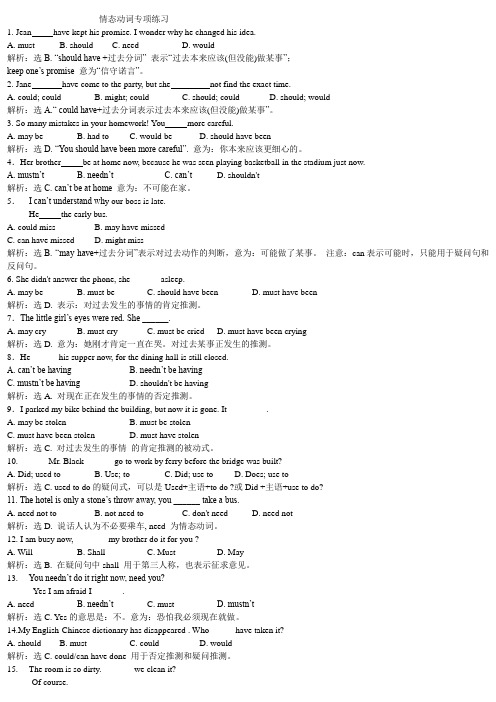
情态动词专项练习1. Jean have kept his promise. I wonder why he changed his idea.A. mustB. shouldC. needD. would解析:选B. “should have +过去分词” 表示“过去本来应该(但没能)做某事”;keep one’s promise 意为“信守诺言”。
2. Jane have come to the party, but she not find the exact time.A. could; couldB. might; couldC. should; couldD. should; would解析:选A.“ could have+过去分词表示过去本来应该(但没能)做某事”。
3. So many mistakes in your homework! You more careful.A. may beB. had toC. would beD. should have been解析:选D. “You should have been more careful”. 意为:你本来应该更细心的。
4.Her brother be at home now, because he was seen playing basketball in the stadium just now.A. mustn’tB. needn’tC. can’tD. shouldn't解析:选C. can’t be at home 意为:不可能在家。
5.---I can’t understand wh y our boss is late.---He the early bus.A. could missB. may have missedC. can have missedD. might miss解析:选B. “may have+过去分词”表示对过去动作的判断,意为:可能做了某事。
【英语】 情态动词练习题(含答案)
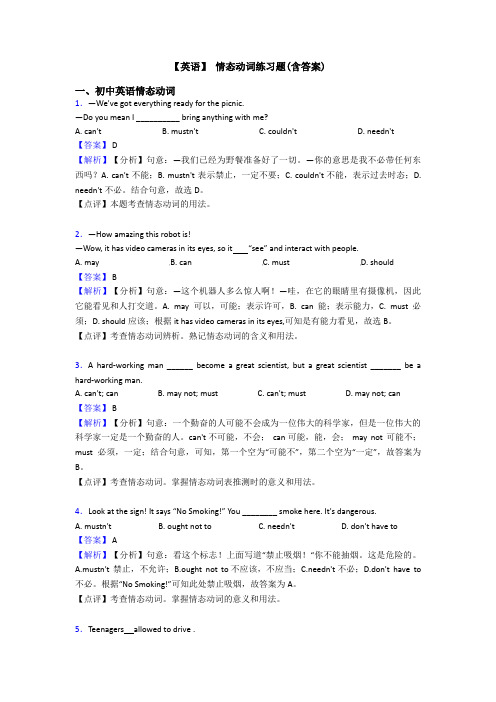
【英语】情态动词练习题(含答案)一、初中英语情态动词1.—We've got everything ready for the picnic.—Do you mean I __________ bring anything with me?A. can'tB. mustn'tC. couldn'tD. needn't【答案】 D【解析】【分析】句意:—我们已经为野餐准备好了一切。
—你的意思是我不必带任何东西吗?A. can't 不能;B. mustn't 表示禁止,一定不要;C. couldn't不能,表示过去时态;D. needn't不必。
结合句意,故选D。
【点评】本题考查情态动词的用法。
2.—How amazing this robot is!—Wow, it has video cameras in its eyes, so it “see” and interact with people.A. mayB. canC. mustD. should【答案】 B【解析】【分析】句意:—这个机器人多么惊人啊!—哇,在它的眼睛里有摄像机,因此它能看见和人打交道。
A. may 可以,可能;表示许可,B. can 能;表示能力,C. must 必须;D. should应该;根据it has video cameras in its eyes,可知是有能力看见,故选B。
【点评】考查情态动词辨析。
熟记情态动词的含义和用法。
3.A hard-working man ______ become a great scientist, but a great scientist _______ be a hard-working man.A. can't; canB. may not; mustC. can't; mustD. may not; can【答案】 B【解析】【分析】句意:一个勤奋的人可能不会成为一位伟大的科学家,但是一位伟大的科学家一定是一个勤奋的人。
- 1、下载文档前请自行甄别文档内容的完整性,平台不提供额外的编辑、内容补充、找答案等附加服务。
- 2、"仅部分预览"的文档,不可在线预览部分如存在完整性等问题,可反馈申请退款(可完整预览的文档不适用该条件!)。
- 3、如文档侵犯您的权益,请联系客服反馈,我们会尽快为您处理(人工客服工作时间:9:00-18:30)。
【英语】情态动词练习题含答案一、单项选择情态动词1.would可以表达过去常常做的事,过去习惯发生的动作:Pirates would bury gold in a cave. 海盗们常常把黄金藏在山洞中。
We would take a walk along the river. 我们过去常常沿河散步。
3. would后接like、love、mind等动词,表示要求、邀请、希望或询问,此时不是说过去,而是对现在的询问:Would you like to come to my party? 你愿意来我的派对吗?Would you mind coming with us? 你介意和我们一起吗?比如本题,would 表示婉转的请求,征求对方的意见,故选A。
2.What a pity! Considering his ability and experience, he ___________ it better.A.need have done B.must have doneC.can have done D.might have done【答案】D【解析】【详解】考查虚拟语气中的情态动词。
句意:真遗憾啊!考虑到他的能力和经验,他也许可以做得更好。
can have done较少使用此结构,表示对过去行为的怀疑;用于疑问句时意为“难道真的做了吗”,表示怀疑;need have done需要做某事,实际上却未做(表示虚拟语气);must have done一定做了某事(表示对过去发生的事情的肯定推测);might have done表示对发生过的事情的推测,意思是“可能已经”或“也许已经”,用于肯定句中。
故D正确。
【点睛】本题是高考必考考点,一定要牢记句型意思。
must have done过去肯定做了某事。
should have done本应该做而实际未做。
can’t have done过去不可能做了某事;shouldn’t have done 本不应该做而实际做了。
need have done本有必要做某事而没做;needn’t have done本没有必要做某事;注意没有mustn’t have done的形式。
3.—Did you attend the meeting for the experiment project yesterday?—Yes, but I don’t think I ____ because my director was there.A.need to have B.need to C.needed to D.need have【答案】D【解析】【分析】【详解】考查情态动词+have done。
句意:——你昨天参加实验项目的会议了吗?——是的,但我想我(本来)不需要,因为我的主管在那里。
Think/suppose等宾语从句中如果有否定词时,要把从句的否定词not前移,即“否定前移”。
所以not是从句中的否定词。
“need havedo ne”意为“本来有必要做而未做”;“needn’t have done”指过去本来没必要做而做了。
根据上一句时间状语“yesterday”可知本句指的是过去发生的事。
结合第二句“because my director was there(我的主管)在”可推断出,我本来不必要去。
故选D。
4.Traveling by subway ______ sometimes be quite an adventure, especially during the rush hour.A.must B.can C.shall D.should【答案】B【解析】【详解】考查情态动词。
句意:乘地铁旅行有时可能相当冒险,尤其是在交通高峰期。
A. must必须;一定;B. can能够;可能;C. shall将会;D. should应该;应当。
本句中can表示客观可能性(客观原因形成的能力),故选B。
5.Using AI, many companies are now conducting experiments that__________ possible just a few years ago.A.would have been B.might have beenC.shouldn't have been D.couldn't have been【答案】D【解析】【详解】考查情态动词表推测。
句意:很多公司现在使用人工智能进行试验,这在几年前是不可能的。
根据“a few years ago”可知,此处表示“过去不可能”,应该用couldn’t have done,故D 项正确。
6.Our English teacher is considerate,helpful,and warm-hearted,but sometimesshe________________ be angry at our silly mistakes.A.should B.mustC.can D.shall【答案】C【解析】【详解】考查情态动词。
句意:我们的英语老师很体贴、乐于助人、热心肠,但有时她可能为我们愚蠢的错误而发火。
can表示一种客观的可能性,但不一定会发生,故C项正确。
7.Look! There are so many mistakes in your composition. You ________ have fixed full attention on it.A.can B.shouldC.need D.might【答案】B【解析】【详解】考查情态动词。
句意:看!你的作文里有那么多的错误。
你本应该把所有的注意力都集中在它上面的。
表示“本应该做但实际上没有做”应该用should have done结构,can have done 表示可能;need表示需要;might have done表示可能做过某事;故选B。
8.It_____ have been Tom that parked the car here, as he is the only one with a car.A.may B.can C.must D.should【答案】C【解析】【详解】考查情态动词表猜测的用法。
句意:一定是汤姆把车停在这儿的,因为他是唯一有车的人。
A. may可能;B. can可能;C. must一定;D. should应该。
由as he is the only one with a car.可知一定是他把车停在这里的,非常有把握的肯定推测,故选C。
9.—You rang me up at about 10:00 last night, didn't you?—No, I didn't phone you. It someone else.A.must have been B.could be C.must be D.could have been 【答案】A【解析】【详解】考查情态动词+have done。
句意:“昨晚10点左右你给我打了电话,是吗?”“不,我没给你打电话。
一定是别人干的。
” must have done 是对过去发生的动作最有把握的猜测,意思是“一定”,结合语境可知,我没有打电话给你,因此猜测一定有别人给你打了电话。
故选A 项。
10.Lack of sleep _______ lead to weakened immunity and memory, and also slow physical growth.A.shall B.must C.should D.can【答案】D【解析】【详解】考查情态动词辨析。
句意:睡眠不足会导致免疫力和记忆力下降,还会减缓身体发育。
A. shall将;B. must必须;C. should应该;D. can会,表示理论上或是逻辑判断上,用can,故选D。
11.I often felt troubled in my teens and my grandma ________ comfort me, saying “Life is like that, dear”.A.would B.might C.should D.must【答案】A【解析】【详解】考查情态动词。
句意:在我十几岁的时候,我经常感到烦恼,我的奶奶会安慰我说,“生活就是这样,亲爱的”。
此处是would+动词原形,表示“过去总是做某事”。
故选A。
12.One of our rules is that every student _______ wear school uniform while at school. A.might B.couldC.shall D.will【答案】C【解析】【详解】考查情态动词辨析。
句意:我们其中一条规则要求每个学生在校期间都要穿校服。
shall可以表示“命令,警告,强制要求;允诺;法律,规定要做……”,结合句意可知C正确。
13.It has been announced that all the candidates ___________ remain in their seats until all the papers have been collected.A.shall B.couldC.would D.ought【答案】A【解析】【详解】考查情态动词用法。
句意:据宣布,所有的候选人都要坐在位置上,直到所有的试卷都被收齐。
根据句意可知本句是考试规则,情态动词shall可以表示“按照规则/规定/法律要做的事情”,符合本句语境。
故A项正确。
14.It is really cold and the ground is wet; it ________ have rained last night.A.might B.mustC.can D.should【答案】B【解析】【详解】考查情态动词辨析。
句意:天气很冷而且地面是湿的,昨晚一定下了雨。
根据上文the ground is wet可知,“昨晚下了雨”是肯定的,故用must have done“必定做了……”表示对过去十分有把握的推测,故选B。
【点睛】must have done用法辨析must have done:表示对过去的肯定的逻辑推测,推定某件事情、动作或状态可能在过去发生过(存在过)。
He must have been a doctor, for he knows medicine so well. 他过去肯定是一位医生,他对医学如此了解。
Somebody must have stolen the ring. 肯定有人偷了这枚戒指. [该句所推断的偷窃动作发生在过去.]The temperature must have dropped to below zero last night, because the water is frozen all over.昨夜的温度肯定降到零度以下,因为水都冻住了。
